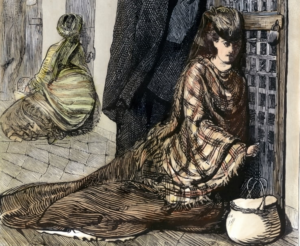Values of the Temporary

In the miserable Western world of today the various expressions of ‘liberal democracy’ have become so ingrained in our lives that we believe they are in every sense (despite being political concepts) synonymous with the values of ‘the good’.
This strange structure of democratic public virtue has overflowed into other (seemingly) unrelated facets of life. The fleeting, unaccountable nature of political office (which replaced responsible hereditary monarchy) has permeated mass-morality at the conceptual level, even in some cases the hard-natural-law of family values. This faux-morality is centered around the presentation of nice-sounding platitudes (ultimately falsehoods) via an expected mode of expression, and never the actual content of the expression. Nothing permanent or genealogical is permitted into a worldview comprised of the expected shallowness and fakeness of the ‘outward face’. But to make matters worse, things have degraded so far that even the secret inner morality is now generally a matter of political selfishness, with no permanent values at all, beyond acquisition of wealth and status.
The only merit one can espouse, publicly, is compassion and anti-oppression-activism. A permanent childish war to exhibit the most crocodile tears; the most harmlessness, the most sentimentally-presented commodity.
Modern people believe marketing has value because they now expect to be talked to like a herd of emotive cattle, incensed by target words and gaslighting signals. They believe you do not present an item of originality or art, to compete and be recognized on its own merits. They believe you produce a variation or copy of a proven generic or existing thing. The more times it has been already recycled the better.
Only in such a degraded age could we have accepted such wasteful and irresponsible nonsense as ‘planned obsolescence’ as normal behaviour. Only in a such a truly omniscient liberal democratic system of supply and demand, could culture and items of art and usefulness all be reduced to numerical economic quantities. Quality has slowly eased out of the picture altogether, as every business and every person interacts with one another like the weaselly rat-politician.
The 1982 ‘broken windows theory’ of James Wilson and George Kelling states that any neighborhood (regardless of wealth) with one broken window will soon lead to many more. Because one unrepaired window emits a social signal that no one cares, and so breaking more costs nothing, leading to disorder. Not having the courage or effort to stand up and repair the first window, we have let the building and the street and the city fall into disrepair. This is indicative of the nature of a viral idea, whether it spreads naturally, or by manipulation (media) – the values of the temporary and the unaccountable have now spread in this fashion. We have decided, with our smug political values, to treat tradition and history like a rubbish tip.
Rampant disorder increases fear, and decreases participation. I think soon these waifish political anarchists are going to get a taste of a kind of real anarchy, as things break down structurally from lack of responsibility. And I do not think it will be as flavoured with ‘social justice’ as they would have liked.











